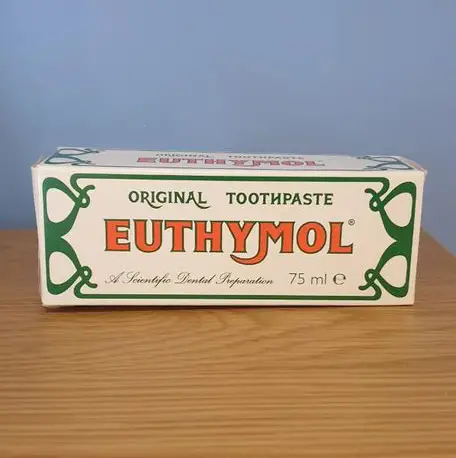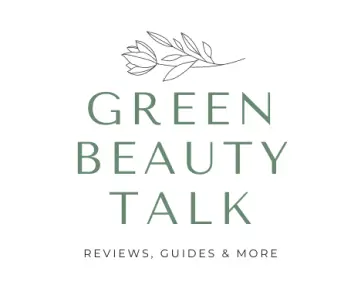
One day I was in a supermarket browsing a section with toothpastes looking for the most natural toothpaste that I could find. I was mainly interested in fluoride-free toothpaste. Euthymol toothpaste got my attention as the packaging stood out with its bold old-fashioned design. I quickly discovered it didn’t contain any fluoride which was exactly what I was looking for so I bought it to give it a try. Later I decided to research its ingredients in detail. In this review, you will find out what I discovered.
Key Discoveries:
- Euthymol toothpaste contains a blend of natural and synthetic ingredients which help to freshen your breath, prevent gum disease and whiten your teeth.
- Some may find it irritating though, suggesting it’s not ideal for everyone.
- Its eco-friendly approach is a plus for the environment.
Table of Contents
- A Closer Look at What’s Inside Euthymol Toothpaste
- Is Euthymol toothpaste natural?
- Review
- Benefits of Using Euthymol Toothpaste
- Potential Side Effects
- FAQs
Disclaimer: This post contains affiliate links which means I may get a small commission if you purchase a product after clicking on a link. This does not cost you anything. As an Amazon Associate, I earn from qualifying purchases.
A Closer Look at What’s Inside Euthymol Toothpaste
In Euthymol toothpaste you will find the following ingredients:
Dicalcium Phosphate Dihydrate – a safe abrasive that is more effective in removing plaque than sodium bicarbonate. It helps to remineralise teeth and prevents tooth decay. An alternative to fluoride.
Aqua – water
Sorbitol – is naturally found in some fruits but it is also commercially manufactured for use in various products. It is slightly sweet (but does not cause cavities) and helps to hold toothpaste together.
Glycerin – a harmless moisturising compound derived from vegetable oils or animal fats. Normally used in skincare products but it’s also useful in toothpaste as it prevents it from drying out and when it’s in the mouth it prevents dryness during brushing.
Methyl Salicylate – an analgesic (relieves pain) that is normally used externally to treat minor muscular and joint pains. It is also known as the oil of wintergreen and smells and tastes minty. It has a cooling effect.
Sodium Lauryl Sulfate – a synthetic foaming agent that may irritate your mouth and increase the risk of mouth ulcers. It may also cause dermatitis.
CI77891 (titanium dioxide) – mineral colourant (white) that is harmful when inhaled. There are also concerns about its safety when ingested, in particular its long-term effects.
Carrageenan – natural thickener derived from red algae. Some people find it irritating.
Cellulose Gum – stabilizer and thickener derived from cellulose (found in the cell walls of all plants).
Sodium Silicate – a buffering agent that can cause irritation and allergic reactions in some people.
Hydrated Silica – acts as an abrasive to remove stains which can help whiten teeth (naturally derived ingredient).
Thymol – the major component of thyme oil with anti-bacterial and anti-septic properties. It can help prevent bad breath and the formation of plaque. It’s also beneficial if you have gingivitis, gum disease and cavities.
Sodium Saccharin – artificial sweetener generally considered safe; does not cause cavities.
Sodium Hydroxide – neutralizes the PH of certain ingredients (also known as lye or caustic soda). It is considered safe in low concentrations.
Menthol – obtained from the oils of mints but can also be made synthetically. It has a cooling effect, a minty flavour and leaves the mouth feeling fresh and clean.
CI 14720 – synthetic red dye with some safety concerns.
Is Euthymol toothpaste natural?
Euthymol toothpaste contains several natural ingredients such as glycerin, wintergreen oil, carrageenan, cellulose gum, thymol, and menthol. It is not an all-natural product though as it also contains several synthetic ingredients.
Review
Flavour
The flavour of Euthymol toothpaste is quite unusual, it’s very medicinal and herbal. It takes a bit of time to get used to it. I am not the biggest fan of the flavour but I can cope with it; it’s not amazing but it’s bearable and you can definitely get used to it. Some people may not like it though as it’s pretty strong.
Texture
The texture of this toothpaste is quite standard, and quite thick and once you start brushing, it foams nicely, just enough and not too much.
Colour
This is the only toothpaste that I’ve tried that is actually pink, yes pink! It’s very unusual and I don’t know why they had to put this artificial colourant in (CI 14720) to make it pink. There is no benefit to having it pink, so why? Who knows?
Packaging
The tube of Euthymol toothpaste is placed inside a cardboard box. The tube itself is made of recyclable aluminum and has a plastic lid. This means minimal plastic packaging is used which is a big plus and more friendly for the environment.
Results
My teeth feel perfectly clean after using this toothpaste and my mouth is really fresh afterward. I can definitely tell the difference in my breath. The freshness lasts longer than when using other kinds of toothpaste. I must say it does a great job.
Benefits of Using Euthymol Toothpaste
Euthymol Toothpaste comes with the following benefits:
- Rich in Natural Ingredients: Euthymol toothpaste contains several natural ingredients like glycerin, wintergreen oil, carrageenan, cellulose gum, thymol, and menthol. Together, these ingredients work synergistically to promote optimal oral health.
- Effective Against Bad Breath: Thanks to its thymol and menthol content, Euthymol toothpaste combats bad breath, leaving your mouth feeling fresh for extended periods.
- Teeth Whitening Capabilities: The presence of hydrated silica and dicalcium phosphate dihydrate in the toothpaste helps to remove stains and plaque, contributing to a whiter smile.
- Gum Disease Prevention: Thymol, a major component of this toothpaste, has anti-bacterial and anti-septic properties, making it beneficial for those with gum disease or gingivitis.
- Environmentally Friendly Packaging: The recyclable aluminum tube minimizes plastic usage, making it a more eco-friendly choice for consumers.
Potential Side Effects
Euthymol toothpaste, while beneficial, contains certain ingredients that might cause discomfort for some users:
- Irritation: Ingredients like Sodium Lauryl Sulfate (SLS) can irritate the mouth, potentially leading to mouth ulcers or dermatitis. Sodium Silicate, a buffering agent, might also cause irritation in some individuals.
- Allergic Reactions: The synthetic red dye, CI 14720, has raised some safety concerns and could trigger allergic reactions in those sensitive to it.
It’s essential to be aware of these potential side effects. If you experience any discomfort or unusual symptoms, it’s advisable to consult with a dental professional.
FAQs
Is Euthymol toothpaste good for bad breath?
Yes, Euthymol toothpaste is good for bad breath since it contains bacteria-killing thymol and refreshing menthol. Many users have reported it keeps their mouth feeling fresh for longer.
Does Euthymol toothpaste whiten teeth?
Euthymol toothpaste contains hydrated silica which is a well-known abrasive that can help whiten teeth by removing stains.
The toothpaste also contains abrasive dicalcium phosphate dihydrate which helps to remove plaque that could cause teeth to become yellow.
Although the toothpaste is not marketed as whitening toothpaste it does contain teeth-whitening ingredients and many reviewers online confirm it does help to whiten teeth.
Is Euthymol toothpaste good for gum disease?
Euthymol toothpaste contains thymol, known for its anti-bacterial and anti-septic properties beneficial for gum health. Many users have shared positive feedback online, stating that the toothpaste has noticeably improved their gum-related issues.
Is Euthymol toothpaste good or bad for you?
Euthymol toothpaste has its good and bad sides. On the good side, it contains beneficial natural ingredients like hydrated silica, menthol, and thymol that are known to promote oral health, whiten teeth and tackle bad breath. Plus, its environmentally-friendly packaging is a bonus.
However, it’s not all rosy. The toothpaste contains Sodium Lauryl Sulfate (SLS) which can give you mouth ulcers, titanium dioxide with concerns when ingested, and CI 14720, a synthetic red dye that raises some safety eyebrows.
Personally, I wouldn’t use it as my everyday toothpaste. But as an occasional switch from my regular Kingfisher? Definitely worth considering.
Is Euthymol toothpaste good for sensitive teeth?
Euthymol isn’t specifically designed for sensitive teeth. If you have sensitive teeth or gums, its strong flavour and high thymol content might cause discomfort. But, it can be different for everyone. Some might find it okay, others not so much.
If you have sensitive teeth, it’s better to talk to your dentist before trying Euthymol. Your dentist can give you the best advice for your personal situation. Remember, everyone’s teeth are different, and what works for one person may not work for another. So always pick what’s best for your own teeth!
Where can I buy Euthymol toothpaste?
Today you cannot find Euthymol toothpaste in every supermarket but try Sainsbury’s or Tesco and you will have a good chance of finding it there. Alternatively, you can buy it online on Amazon.
Related content:
Weleda Calendula Toothpaste Review
Kingfisher Natural Toothpaste Review

Petra Nakashian (previously Kravos) is a dedicated natural health and beauty blogger, driven by the loss of her parents to cancer, which led her to meticulously research beauty product ingredients. With over 10 years of experience, her in-depth knowledge has made her a trusted expert in the field. Founder of Be Healthy Now and Green Beauty Talk, Petra recently expanded her expertise with Beauty Insights Hub, exploring a wider range of beauty treatments. Committed to transparency and honesty, her work is a vital resource for navigating the complex world of beauty.

